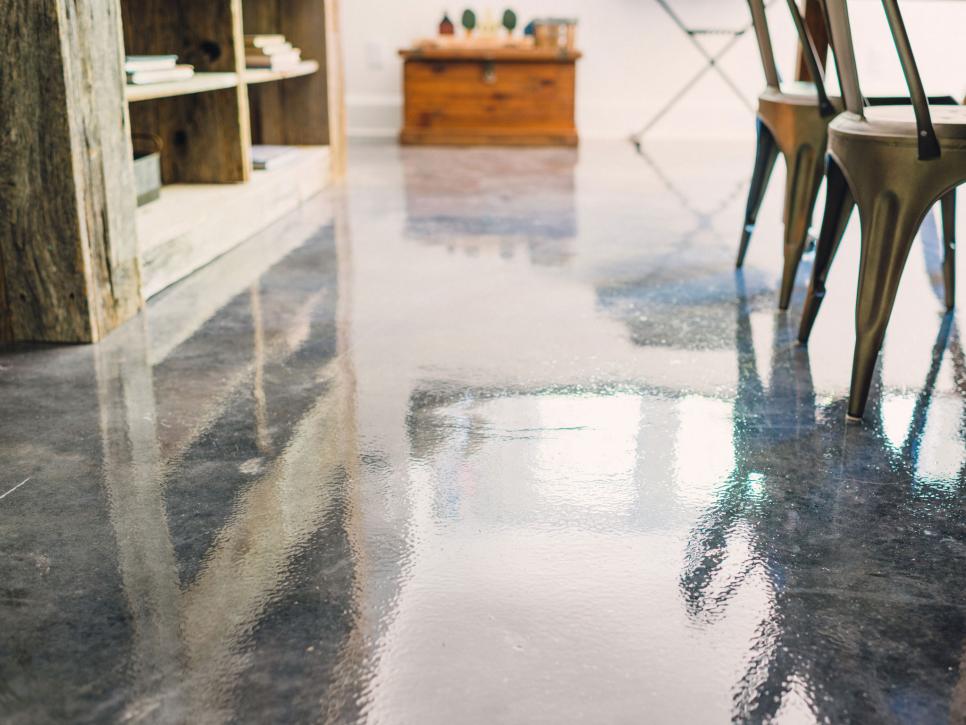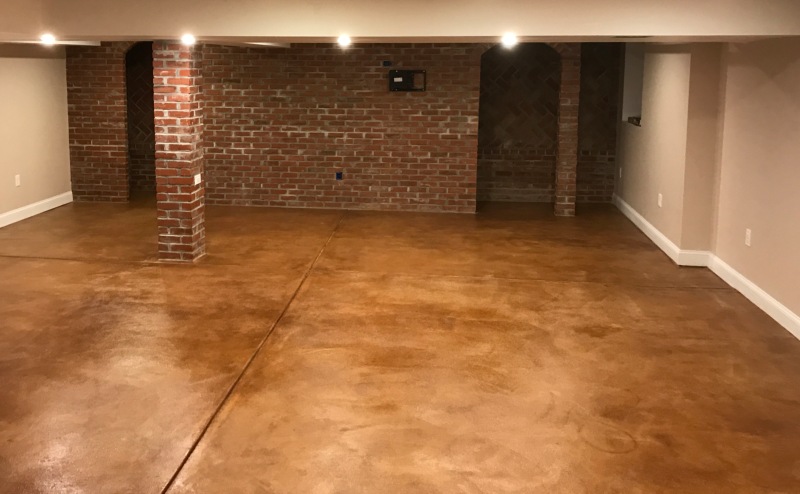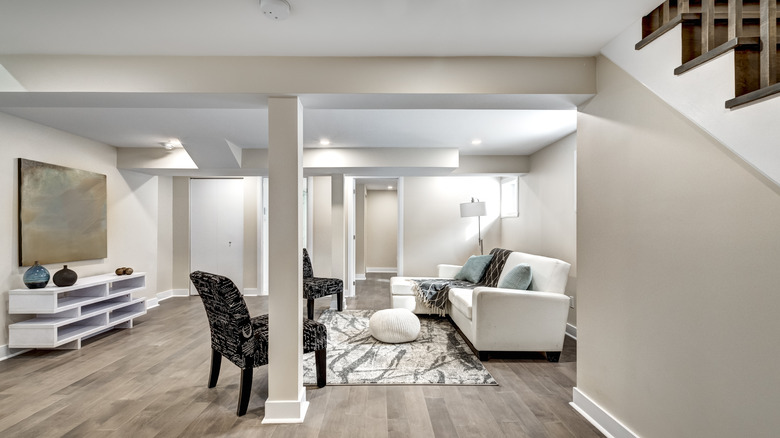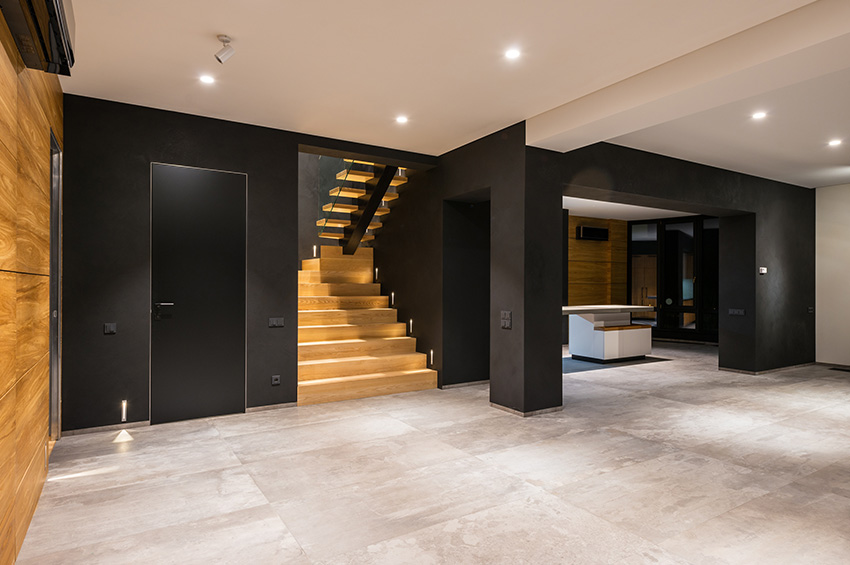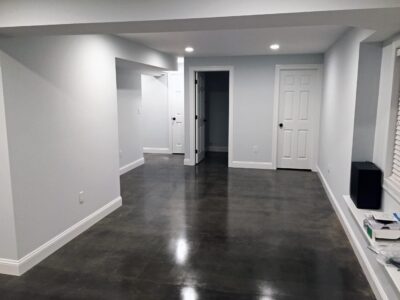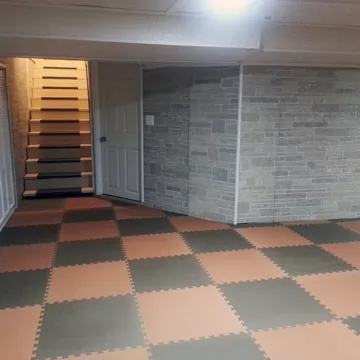Exploring Flooring Options for Basements with Concrete Floors
When it comes to basements with concrete floors, finding the right flooring options can be a challenge. Concrete floors offer a durable and low-maintenance foundation, but they can also be cold and lack the warmth and comfort that other flooring materials provide. However, with the right choice of flooring, you can transform your basement into a cozy and inviting space. Let’s discuss various flooring options that are suitable for basements with concrete floors. Whether you’re looking for a budget-friendly solution or a luxurious upgrade, we’ve got you covered.
- Carpet Tiles: Carpet tiles are a popular choice for basements due to their versatility and ease of installation. They come in a wide range of designs and colors, allowing you to create a customized look for your basement. Carpet tiles are also relatively inexpensive and can be easily replaced if damaged. Additionally, they provide insulation and warmth, making your basement a comfortable space for relaxation or entertainment.
- Vinyl Flooring: Vinyl flooring is another excellent option for basements with concrete floors. It is moisture-resistant, making it suitable for areas that are prone to dampness. Vinyl flooring comes in various styles, including planks and tiles, mimicking the appearance of hardwood or stone. It is also easy to clean and maintain, making it a practical choice for basements that may experience spills or accidents.
- Laminate Flooring: Laminate flooring is a cost-effective alternative to hardwood flooring. It is made of synthetic materials that mimic the look of real wood. Laminate flooring is durable and resistant to moisture, making it suitable for basements. It is also easy to install, thanks to its click-and-lock system. With a wide range of designs available, you can achieve the aesthetic appeal of hardwood without the high price tag.
- Engineered Wood Flooring: If you desire the natural beauty of hardwood flooring in your basement, engineered wood flooring is a suitable option. Unlike solid hardwood, engineered wood is designed to withstand moisture and temperature fluctuations, making it an ideal choice for basements. Engineered wood consists of multiple layers, with a top layer made of real wood. This flooring option provides the warmth and elegance of hardwood while being more resistant to moisture and warping.
- Epoxy Flooring: For a sleek and contemporary look, consider epoxy flooring for your basement. Epoxy is a resin material that is poured over the concrete floor, creating a seamless and glossy finish. It is highly durable and resistant to stains, making it an excellent choice for high-traffic areas. Epoxy flooring is available in various colors and can be customized with patterns or designs to suit your style.

Carpet Tiles: A Cozy and Versatile Choice for Basement Flooring
When it comes to transforming your basement into a cozy and inviting space, carpet tiles are an excellent choice for flooring. They offer versatility, ease of installation, and a wide range of design options. Let’s find out the benefits and considerations of using carpet tiles in basement flooring.
- Easy Installation: One of the main advantages of carpet tiles is their ease of installation. Unlike traditional broadloom carpet, which requires professional installation, carpet tiles can be easily installed by homeowners themselves. They come with a peel-and-stick backing or adhesive squares, allowing for quick and hassle-free installation. This makes carpet tiles a cost-effective choice, as you can save on installation fees.
- Versatility in Design: Carpet tiles come in a multitude of colors, patterns, and textures, giving you endless design possibilities for your basement. Whether you prefer a classic, sophisticated look or a bold, modern statement, there is a carpet tile design to suit your style. Additionally, carpet tiles can be mixed and matched to create unique patterns or borders, allowing you to customize the look of your basement floor.
- Easy Maintenance: Basements can be prone to moisture and spills, but carpet tiles are designed to be durable and easy to clean. Most carpet tiles are made with stain-resistant materials, allowing for easy removal of spills and stains. In the event of a stain that cannot be removed, individual tiles can be easily replaced without having to replace the entire carpet. Regular vacuuming and occasional deep cleaning will keep your carpet tiles looking fresh and vibrant.
- Comfort and Insulation: One of the main advantages of carpet tiles is their ability to provide warmth and insulation to your basement. Concrete floors can often feel cold and uninviting, but carpet tiles offer a soft and comfortable surface to walk on. They also help to insulate the space, making your basement a cozy retreat during colder months. Additionally, carpet tiles absorb sound, reducing noise transmission between floors.
- Cost-Effective Solution: Carpet tiles are an affordable flooring option for basements. Their easy installation and maintenance contribute to cost savings, as you can avoid the need for professional installation and expensive cleaning services. Additionally, should you need to replace a damaged tile, you can do so without incurring significant expenses. Carpet tiles are a budget-friendly choice that doesn’t compromise on style or functionality.
- Considerations: While carpet tiles offer many advantages, it’s important to consider a few factors before choosing them for your basement flooring. Basements can be prone to moisture, so it’s crucial to select carpet tiles that are specifically designed for moisture resistance. Additionally, if your basement is prone to flooding or high humidity levels, it may be worth considering alternative flooring options that are more suitable for such conditions.
Vinyl Plank Flooring: Durable and Waterproof Solution for Concrete Basements
When it comes to basement flooring options, vinyl plank flooring stands out as a durable and waterproof solution. With its ability to mimic the look of hardwood or stone, vinyl plank flooring offers a stylish and practical choice for concrete basements. Here are the benefits and considerations of using vinyl plank flooring in your basement.
Durability and Resilience: One of the main advantages of vinyl plank flooring is its durability. Vinyl planks are constructed with multiple layers, including a wear layer that protects against scratches, stains, and daily wear and tear. This makes vinyl plank flooring a resilient choice for high-traffic areas such as basements. Additionally, vinyl plank flooring is resistant to moisture, making it suitable for basements that may experience occasional dampness.
Waterproof Properties: Basements are known for their potential moisture issues, and vinyl plank flooring excels in this regard. Unlike hardwood or laminate flooring, vinyl plank flooring is waterproof, meaning it can withstand spills, leaks, and even minor flooding without warping or damage. This makes it an ideal choice for basements where moisture may be a concern. With vinyl plank flooring, you can have peace of mind knowing that your basement floor is protected against potential water damage.
Easy Installation and Maintenance: Vinyl plank flooring is known for its ease of installation. Many vinyl plank options feature a click-and-lock system, allowing for simple and straightforward installation without the need for adhesives. This makes it a popular choice for DIY enthusiasts. Additionally, vinyl plank flooring is easy to clean and maintain. Regular sweeping or vacuuming, along with occasional mopping, is usually sufficient to keep the floor looking its best.
Realistic Appearance: Vinyl plank flooring has come a long way in terms of aesthetics. With advanced printing and embossing technologies, vinyl planks can accurately mimic the look and texture of natural materials such as hardwood or stone. This allows you to achieve the desired aesthetic of your basement without the high price tag or maintenance requirements of genuine hardwood or stone flooring. Vinyl plank flooring comes in a variety of colors, patterns, and textures, offering endless design possibilities for your basement.
Comfort and Noise Reduction: Vinyl plank flooring offers a comfortable surface to walk on, thanks to its resilient and cushioned nature. It provides a softer feel underfoot compared to harder flooring options like concrete or tile. Additionally, vinyl plank flooring has sound-absorbing properties, reducing noise transmission between floors. This makes it an excellent choice for basements that serve as living spaces, home theaters, or play areas.
Considerations: While vinyl plank flooring offers numerous benefits, it’s important to consider a few factors before choosing it for your basement. Ensure that the concrete subfloor is clean, level, and properly prepared before installation to ensure optimal performance. Additionally, vinyl plank flooring may not be suitable for basements with extreme temperature fluctuations, as it can expand and contract under such conditions. It’s recommended to consult with a flooring professional to determine the best installation and maintenance practices for your specific basement environment.
Epoxy Coatings: Transforming Your Concrete Basement Floor with Style and Durability
If you’re looking to transform the look of your concrete basement floor while adding durability and style, epoxy coatings are an excellent choice. Epoxy is a resin material that can be applied to concrete floors, creating a seamless and durable finish. Below are the benefits and considerations of using epoxy coatings for your basement floor.
Seamless and Attractive Finish: One of the main advantages of epoxy coatings is the seamless and attractive finish they provide. When properly applied, epoxy creates a smooth and glossy surface that can enhance the overall look of your basement. Epoxy is available in a variety of colors and can even be customized with patterns or designs, allowing you to create a unique and personalized look for your space. Whether you prefer a modern, sleek appearance or a more decorative finish, epoxy coatings offer versatility in design.
Durability and Resistance: Epoxy coatings are known for their durability and resistance to wear and tear. Once applied, epoxy creates a tough and resilient surface that can withstand heavy foot traffic, furniture movement, and other activities common in a basement. It is resistant to stains, chemicals, and moisture, making it an ideal choice for basements that may be exposed to spills or dampness. Epoxy coatings also have excellent resistance to scratches and abrasions, ensuring that your basement floor will continue to look great for years to come.
Easy Maintenance: Maintaining an epoxy-coated basement floor is relatively simple. The smooth and non-porous surface of epoxy makes it easy to clean and maintain. Regular sweeping or dusting, along with occasional mopping using a mild detergent, is usually sufficient to keep the floor looking pristine. Unlike other flooring options that may require specialized cleaning products or treatments, epoxy coatings can be easily maintained with common household cleaning supplies.
Enhanced Safety: Epoxy coatings can also contribute to improved safety in your basement. The glossy finish of epoxy can enhance the lighting in the space by reflecting light, making the area brighter and more inviting. Additionally, epoxy coatings can be customized with anti-slip additives, providing traction and reducing the risk of slips and falls. This is especially important in areas of the basement that may be prone to moisture or where children or elderly individuals may frequent.
Professional Installation: While epoxy coatings can be applied as a DIY project, it is recommended to hire a professional for optimal results. Professional installers have the knowledge and experience to properly prepare the concrete surface, apply the epoxy evenly, and ensure a seamless and durable finish. Hiring a professional can also save you time and effort, as they have access to specialized equipment and materials that may not be readily available for a DIY project.
Considerations: Before opting for epoxy coatings, there are a few considerations to keep in mind. First, ensure that the concrete floor is in good condition and properly prepared before applying the epoxy. Any cracks or imperfections should be addressed beforehand to ensure a smooth and even surface. Additionally, epoxy coatings may not be suitable for basements with significant moisture issues or high levels of humidity. Consulting with a professional installer can help determine the suitability of epoxy coatings for your specific basement environment.
Engineered Wood: Adding Warmth and Charm to Your Basement with Concrete Floors
When it comes to adding warmth and charm to your basement with concrete floors, engineered wood flooring is a fantastic option. Engineered wood is designed to withstand moisture and temperature fluctuations, making it an ideal choice for basements. Here are the benefits and considerations of using engineered wood flooring in your basement.
Real Wood Appeal: Engineered wood flooring offers the beauty and authenticity of real wood. It consists of multiple layers, with a top layer made of real wood veneer. This gives it the natural appearance and warmth that comes with hardwood flooring. With engineered wood, you can achieve the desired aesthetic appeal of hardwood while ensuring the durability and moisture resistance needed for basement floors.
Moisture Resistance: Unlike solid hardwood flooring, engineered wood has better resistance to moisture. It is designed with layers of plywood or high-density fiberboard (HDF), which provide stability and prevent warping or buckling in the presence of moisture. This makes engineered wood flooring an excellent choice for basements, where humidity and occasional dampness may be a concern.
Stability and Durability: Engineered wood flooring is known for its stability and durability. The layers of plywood or HDF in engineered wood provide structural integrity, making it less susceptible to expansion and contraction due to temperature and humidity changes. This stability ensures that the flooring remains intact and maintains its original appearance, even in basement environments where moisture levels can fluctuate.
Easy Installation: Engineered wood flooring is designed with a click-and-lock or tongue-and-groove system, making it relatively easy to install. The planks can be easily interlocked and secured in place without the need for adhesives or nails. This not only simplifies the installation process but also allows for ease of maintenance and potential future adjustments or replacements if needed.
Compatibility with Radiant Heating: If your basement has radiant heating, engineered wood flooring is a compatible choice. The construction of engineered wood allows for better heat transfer compared to solid hardwood flooring. This means that the warmth from the radiant heating system can efficiently penetrate through the flooring, providing a comfortable and cozy environment in your basement.
Considerations: While engineered wood flooring offers numerous benefits, it’s important to consider a few factors before choosing it for your basement. Ensure that the concrete subfloor is clean, level, and properly prepared before installation to ensure optimal performance. Additionally, engineered wood may not be suitable for basements with high moisture levels or the potential for flooding. It’s recommended to consult with a flooring professional to assess the suitability of engineered wood flooring for your specific basement conditions.
Basement Flooring Ideas for Your Home
A Guide to Stained Concrete Basement Floors
Ideas For Basement Flooring
Inspiring Ideas for Basement Flooring in Portland
Basement Floor Staining Ideas Direct Colors
Budget Basement Flooring Ideas: Foam, Rubber & Carpet Tiles
Best Basement Flooring Ideas for Your Home
Related Posts:
- High Gloss Concrete Floor Sealer
- Concrete Floor Finishes
- Tinted Concrete Floors
- Concrete Floor Refinishing DIY
- Concrete Floor For Garage
- Concrete Floor Cleaning Tips
- DIY Concrete Floor Paint
- Gray Concrete Floor Paint
- Concrete Floor Cleaning Solution
- Redo Concrete Floors

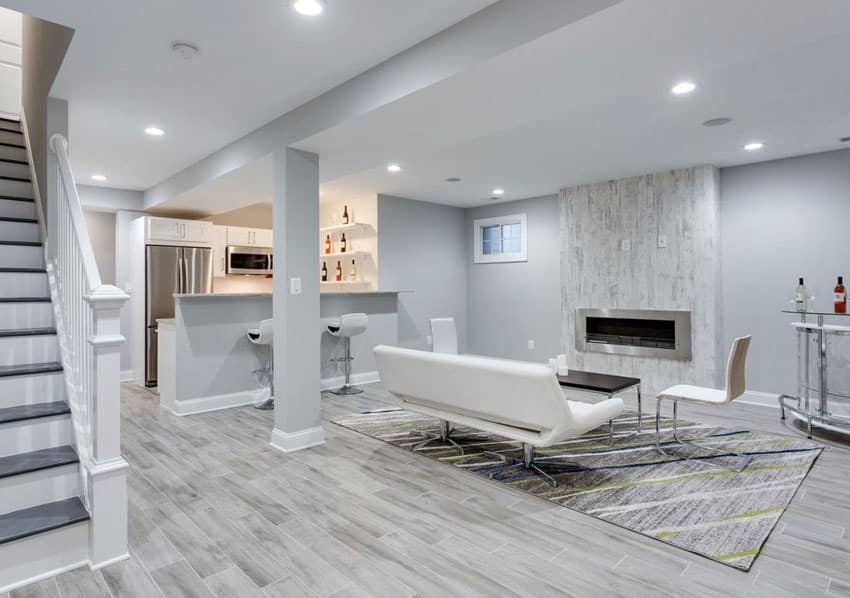
.jpg?widthu003d800u0026nameu003d11513489635_f12521f2a2_k%20(1).jpg)
